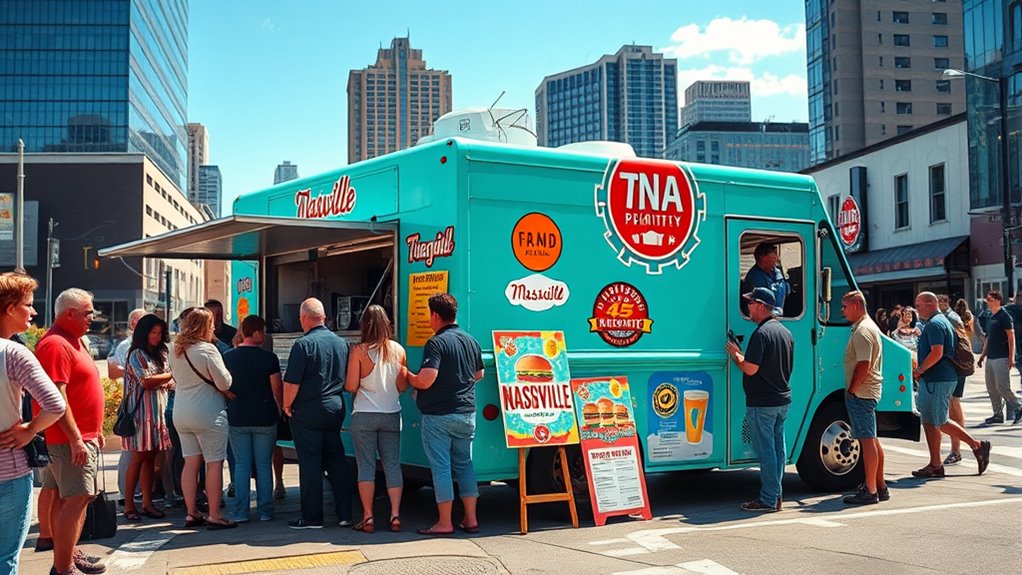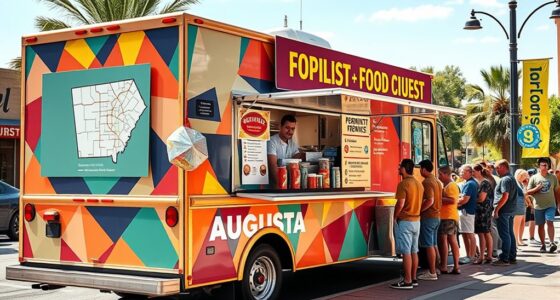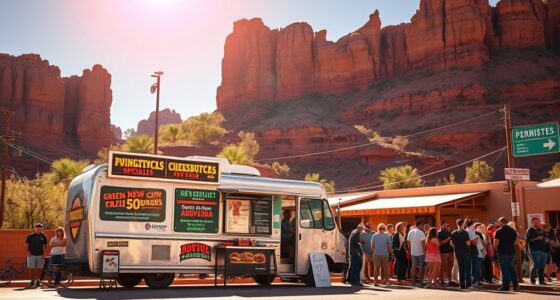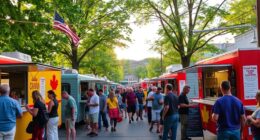To open a food truck in Nashville, you’ll need permits from the Nashville Planning Department, a fire safety inspection, health department certification, and a Tennessee business license, with costs around $50 and up to $2,000 for permits and insurance. Choose busy locations like Broadway or parks and craft a simple, appealing menu with competitive pricing. Focus on branding and marketing via social media and partnerships. Keep exploring to learn how to navigate costs, permits, and success strategies effectively.
Key Takeaways
- Obtain necessary permits including Mobile Food Service Vehicle, fire safety, health, and park permits, with costs around $50-$2,000.
- Startup costs range from $150,000 for new trucks to $15,000 for customization and equipment; plan monthly expenses accordingly.
- Prime locations include downtown hotspots, nightclubs, parks, and designated food truck zones for maximum visibility and sales.
- Develop a simple, seasonal menu with competitive pricing, focusing on efficiency, local ingredients, and catering to diverse dietary needs.
- Build your brand through vibrant wraps, signage, social media, community partnerships, and local SEO to attract and retain customers.
Navigating Permits and Licensing in Nashville
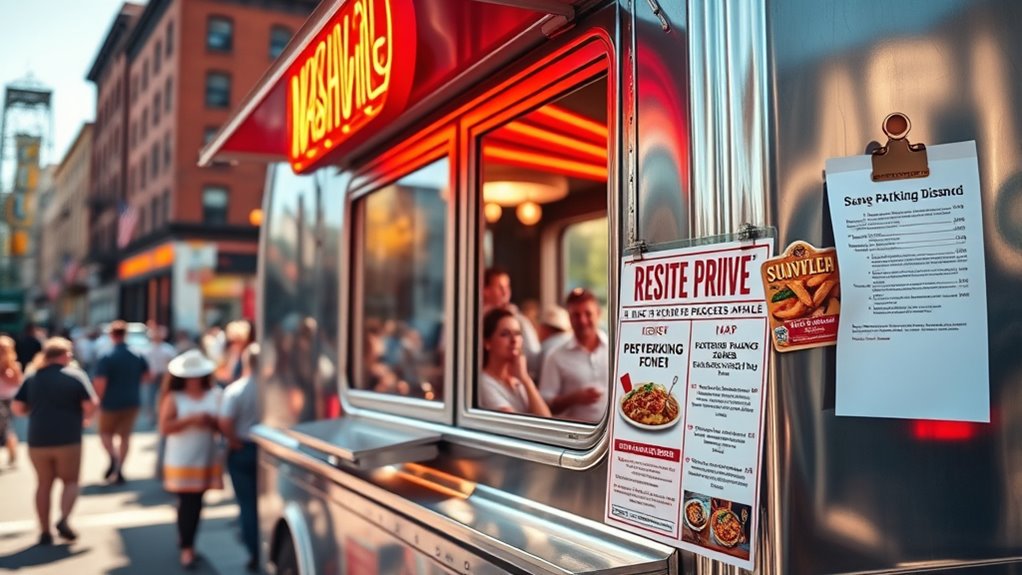
Thinking about starting a food truck in Nashville? You’ll need to navigate several permits and licensing requirements. First, obtain an annual Mobile Food Service Vehicle permit from the Nashville Planning Department at City Hall, costing $50. You must pass a fire safety inspection before getting your permit, which includes checks for cooking equipment, fire suppression, and fire extinguishers. A health department certification is also mandatory, requiring proof of passing inspections. If you plan to operate in Metro Parks, you’ll need a separate permit, proof of liability insurance, and vehicle and menu submissions. Additionally, you’ll need a Tennessee state business license and possibly a federal EIN. Ensuring all these permits are in place is essential before hitting the streets. Non-compliance could lead to fines or permit suspension. Food trucks/trailers must be stored/stationed or serve at least 50% of yearly events within 50 miles of downtown Nashville, so planning your location logistics is also crucial to stay compliant. It’s also important to be aware that maintaining proper permit documentation helps prevent legal issues and ensures smooth operation.
Estimating Startup and Operating Expenses
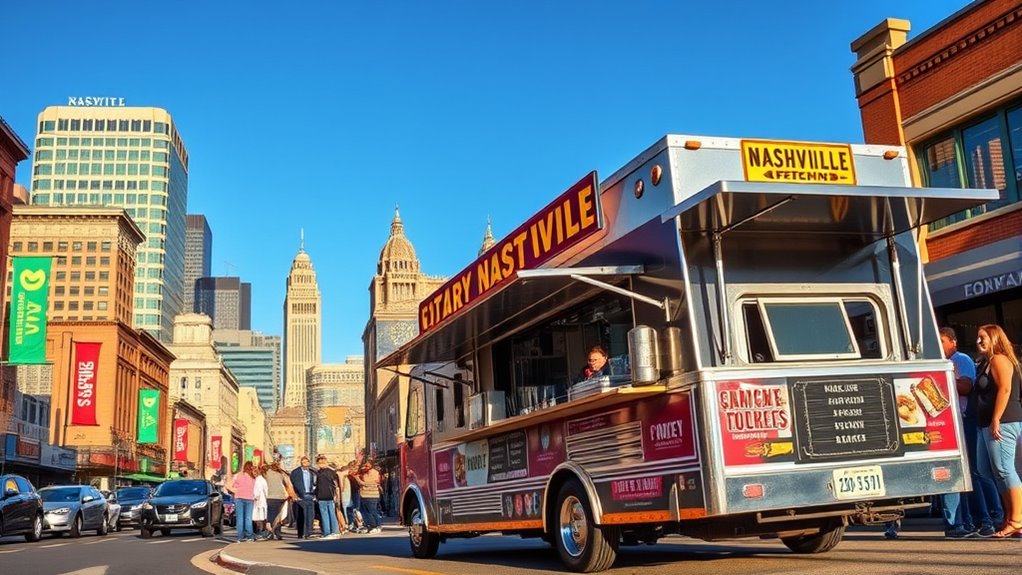
Estimating startup and operating expenses is essential for planning a successful food truck business in Nashville. Your costs will vary based on truck type, customization, permits, and ongoing expenses. Buying a new truck can cost around $150,000, while used trucks are cheaper but may need repairs. Customization, branding, and equipment add $10,000 to $15,000 and $1,700 to $3,000, respectively. Initial inventory costs range from $1,000 to $3,000. Monthly expenses include fuel and maintenance ($500–$1,000), insurance ($540), permits ($1,800–$2,000), parking ($300), and POS systems ($60–$100). Proper budgeting guarantees profitability and smooth operations. Additionally, understanding the costs associated with sustainable and handcrafted materials can help in selecting eco-friendly options that align with your brand values.
Choosing Prime Locations and Parking Zones
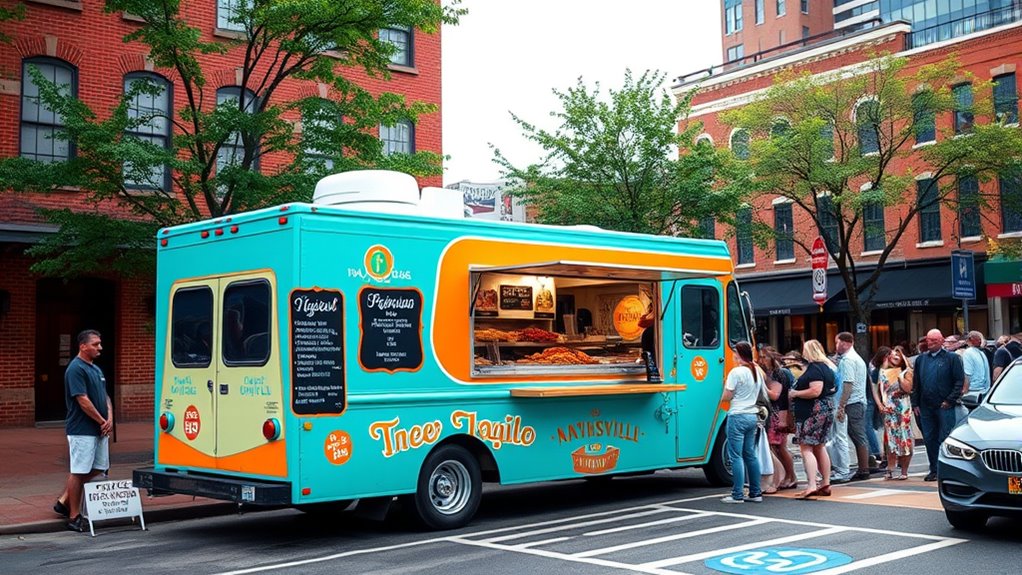
Selecting the right locations and parking zones is crucial for a food truck’s success in Nashville. Downtown areas like Broadway and Deaderick Street see constant foot traffic from tourists and office workers, making them prime spots. Popular spots such as Pins Mechanical and 16-Bit Bar+Arcade attract diverse crowds, while Nashville Farmers Market offers steady urban foot traffic. Streets near nightlife venues like Demonbreun Street draw evening crowds, and parks like Avondale Park provide family-friendly gathering spots. Be aware of Nashville’s parking regulations—many areas require permits or fees, especially in high-demand zones. Parking near office complexes or hospitals can boost lunchtime sales but might need private permissions. Utilizing designated food truck zones and rotating event-based locations maximizes visibility and revenue opportunities. Ensuring your space is accessible and complies with local parking regulations is essential for long-term success.
Crafting a Menu and Pricing Strategies
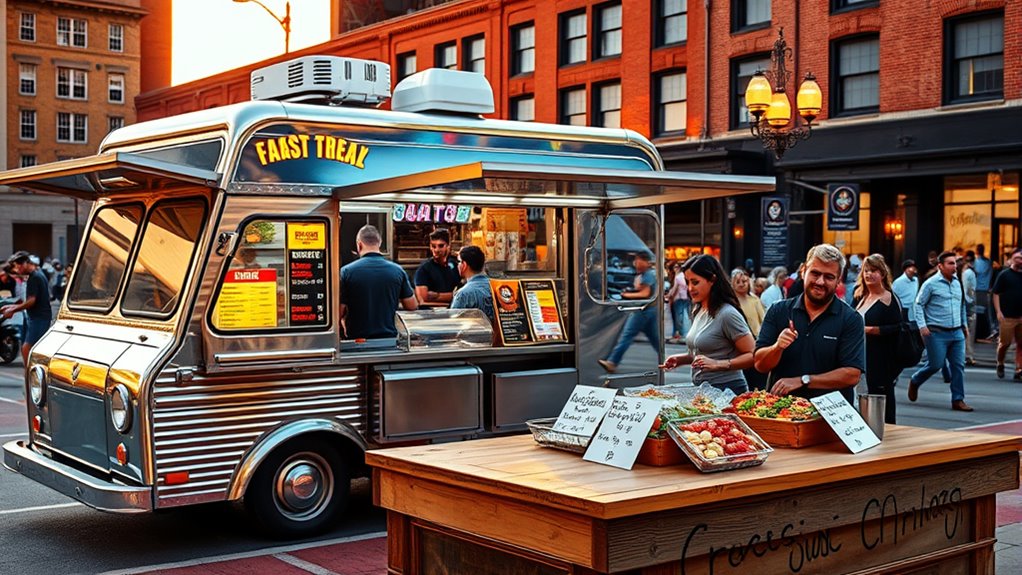
Creating a menu and setting pricing strategies are key steps to guarantee your food truck stands out and remains profitable in Nashville’s competitive market. Your menu should focus on items you can prepare efficiently with your truck’s equipment, adhering to health department rules. Offering signature dishes helps ensure quality and quick service, while seasonal and local ingredients boost freshness and appeal. Your prices must cover permit, insurance, and commissary costs, while remaining attractive to customers. Analyzing local competitors helps you set competitive yet profitable prices, encouraging upsells like combos or drinks. Keep menu options simple but diverse, including vegetarian or gluten-free choices to broaden your reach. Incorporating cost analysis into your pricing strategy ensures you cover expenses and maintain profitability. Well-designed menus and strategic pricing, aligned with perceived value, will attract loyal customers and maximize your food truck’s success.
Building Your Brand and Marketing Your Food Truck
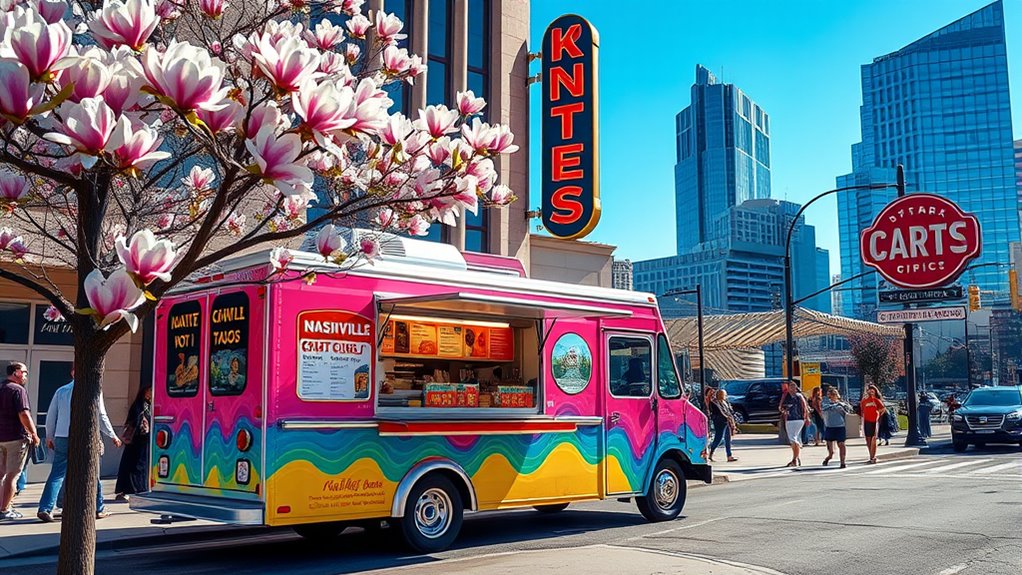
How can you make your food truck stand out in Nashville’s busy streets? Vibrant wraps and eye-catching signage boost visibility and help establish your brand. Create a unique logo and color scheme that reflects your cuisine to make it memorable. Use branded packaging—bags, napkins, stickers—to encourage social sharing and repeat visits. Place QR codes on sandwich boards for easy ordering or loyalty programs, turning your truck into a mobile billboard. Engage on social media by responding to comments, sharing user content, and tagging local hashtags like #NashvilleEats. Partner with local businesses and participate in community events to increase exposure. Leverage digital platforms for online ordering, loyalty rewards, and influencer collaborations. Offline, distribute flyers and merchandise to turn customers into brand ambassadors. Utilize local SEO strategies to ensure your truck appears prominently in online searches and maps for nearby customers seeking food options. Incorporating brand consistency across all marketing touchpoints helps reinforce your identity and build customer trust.
Frequently Asked Questions
How Long Does the Permit Approval Process Typically Take in Nashville?
The current question asks how long the permit approval process takes in Nashville. You’ll find that it varies based on application completeness, inspection scheduling, and departmental workloads. Typically, it can take anywhere from a few weeks to over a month. To expedite things, make sure all your documents are accurate and submitted early, and coordinate your fire and health inspections promptly. Planning ahead helps ensure a smoother approval process.
Are There Any Specific Health Regulations Unique to Nashville Food Trucks?
You’ll find Nashville has specific health regulations for food trucks, like keeping receipts for gray water disposal for at least 30 days and using approved commissaries for storage. You must submit detailed floor plans, guarantee mobility at all times, and comply with fire safety standards. Additionally, Nashville requires proper documentation for food safety, water sources, and menu storage, all to protect public health and ensure your truck meets local health department standards.
Can I Operate a Food Truck on Private Property Without City Permits?
You might think operating on private property frees you from city permits, but it doesn’t. Nashville’s rules require you to have a Mobile Food Service Vehicle permit, even on private land. Operating without this permit risks fines and shutdowns. So, while landowner permission is essential, securing the proper city permits ensures your food truck runs smoothly and legally, no matter where you park.
What Are the Best Times of Year to Launch a Food Truck in Nashville?
You should consider launching your Nashville food truck in late spring or early fall. These times align with warm, pleasant weather, boosting outdoor dining and foot traffic. Spring (April-May) and fall (September-October) also coincide with major festivals and events, increasing your visibility and customer base. Avoid winter months, as colder weather and decreased outdoor activity can limit your success. Timing your launch during these peak seasons helps maximize your initial impact and sales.
How Can I Find Reliable Commissary Kitchens in Nashville?
Finding a reliable commissary kitchen in Nashville is like hitting two birds with one stone. You should start by researching options like the Nashville Farmers’ Market Commissary or Cooks’ Kitchen, which offer licensed, secure, and well-equipped spaces. Check their availability, costs, and amenities online, and don’t hesitate to tour facilities to guarantee they meet your needs. Connecting with community groups can also point you toward trusted kitchens.
Conclusion
Starting your food truck journey in Nashville is like planting a seed—careful planning and passion will help it flourish. With the right permits, a well-crafted menu, and strategic marketing, you’ll create a vibrant spot that draws in locals and visitors alike. Embrace each step as a chance to grow and thrive, turning your dream into a delicious reality. Before long, your food truck will become a favorite hidden gem in the Music City’s bustling scene.
